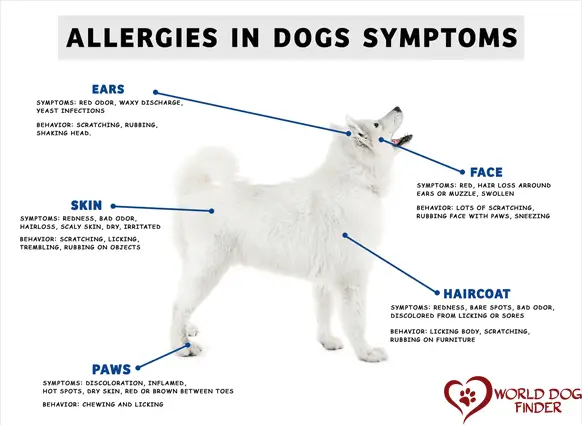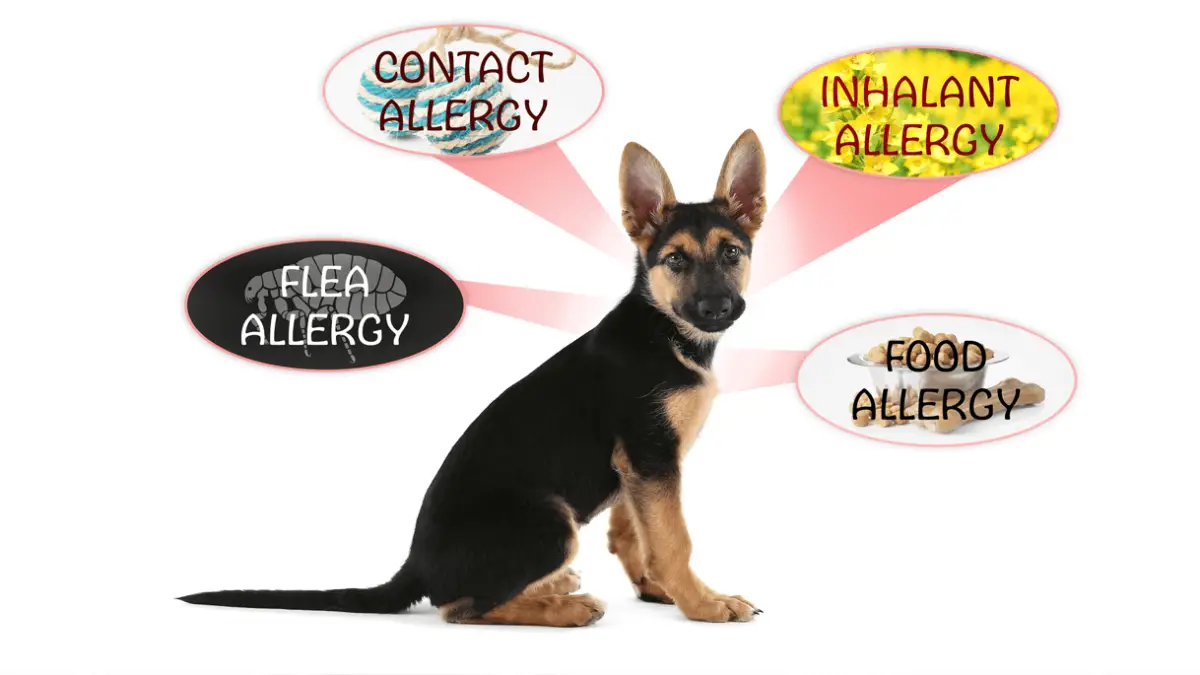What Is The Best Allergy Medicine For Dogs?
03.02.2021.
Just like humans, dogs, too can suffer from allergies. Since they are a part of our family, we immediately want to help them. Our mind directly goes to - Allergy medicine!
There are several available human allergy medications, and not all are safe for our dogs to use. Generally, reaching into our own medicine cabinet to help our dogs is not the best idea. They can use some over-the-counter medicine only after you consult your vet first.
These three allergy meds are usually used by humans, and they can be given to dogs under strict regulation and specific dosage - Benadryl, Claritin, and Zyrtec. They all have different active ingredients, but they are generally safe for dogs to use. We will tell you all you need to know about them, but we need to start with the basics first.
How to spot dog allergies?
The first thing you will probably notice is your dog is acting unusual. They will start scratching, biting, licking, and pawing at certain affected areas. The problem is they won’t stop until they create a “hot spot,” and some dogs can scratch themselves so much they start bleeding. To help our dogs with allergies, vets need to determine what the dog is allergic to.

Types of allergies
There are three types of dog allergies, and all of them need a different approach to solve them. Generally, an allergic dog might require antihistamine meds. Still, the key is to remove the thing that causes allergies to begin with. The three types of allergies are;
1. Food
Just like humans, dogs can be allergic to certain things in their diet. There is no way of knowing if your dog might be allergic to something; all dogs can develop allergies. Some dogs can’t handle chicken, and others can’t handle grain. Sadly, the only way to know for sure is with an allergy test or wait and see if your dog reacts to a specific food.
RELATED: Dog Food Allergies: What Are They & How To Spot Them
2. Flea
Fleas are nasty. Our dogs hate them, and fleas can make their lives miserable. Some dogs are allergic to flea bites, and even one flea bite can cause an allergic reaction. That reaction is called flea allergy dermatitis or fleabite hypersensitivity.
RELATED: Tips to Help Protect Your Dog From Fleas and Ticks
3. Atopy
Atopy refers to environmental allergies. Yes, dogs can be allergic to pollen and other allergens from the environment. Dogs’ bodies start releasing histamine when exposed to these allergens, and their allergy symptoms get triggered.
Allergy symptoms
Similar to us, dogs can develop milder and more severe allergy symptoms. There is a good possibility they will need help, and usually, we can give our dogs antihistamines. However, before we do that, we need to understand which symptoms point to an allergic reaction. The most common symptoms are:
- Scratching
- Itchy skin
- Biting a specific spot on their bodies
- Chewing a specific spot on their bodies
- Sneezing
- Itchy, watery, or red eyes
- Wheezing
- Hives
- Panting
- Runny nose
- Nasal congestion

As you can see, it is clear that these symptoms can be pretty irritating. Luckily, dog allergies rarely have serious consequences if treated. If you notice your dog has these symptoms, you will probably wonder, “What can I give my dog for allergies?”
Antihistamine for dogs
The most common way to take care of allergies is an antihistamine. The three most popular ones humans use are the abovementioned Benadryl, Claritin, and Zyrtec. The most used one is Benadryl.
Unfortunately, antihistamines lose effectiveness over time, which means the dosage should be increased, which can be dangerous for your dog. You don’t want to end up overdosing your dog. There are other allergy meds for dogs, but they can only be given by vets. Here is a short introduction to the most commonly used over-the-counter allergy meds for dogs.
1. Benadryl
Benadryl is one of the most popular allergy meds for humans, and dogs can use it safely as well. Benadryl’s active ingredient is diphenhydramine, which controls the histamine uptake. You can read more about it here - Benadryl for Dogs.
2. Claritin
Claritin is a popular antihistamine med that dogs can safely use. Its active ingredient is loratadine. Loratadine is safe for dogs, but the intake should be closely controlled. Small dogs should get 5 milligrams a day, medium-large dogs 10 milligrams with 2 doses per day, and larger dogs can reach 20 milligrams in two 10-milligram doses per day.
RELATED: Is Claritin Safe For Dogs?

3. Zyrtec
Zyrtec is another antihistamine med that is safe for dogs to use. It is an OTC medication that can be bought in your local drugstore. The correct dosage should be discussed with your vet and will depend on the severity of the symptoms. The average dosage is a 10-pound dog should get a 5-milligram pill, a 20-pound dog should be given a 10-milligram pill, and a 40-pound dog can get a 20-milligram pill. The maximum dosage is 20 milligrams, and no matter the dog’s size, the 20-milligram mark should not be crossed. You can read more about this allergy medication for dogs here - Zyrtec for dogs.
All of these allergy meds are available in different forms; pills, liquids, or capsules. The best and easiest way to measure exact dosages is the pill. Allergy pills for dogs should be effective, and you should keep a close eye on your dog after they get the medication for the first time.
RELATED: When do Vets Recommend Zyrtec for Dogs?
Other allergy medications for dogs
Antihistamine medications are not the only option for dogs with allergies. As we said, dogs build up immunity to these meds, and over time, they lose their potency. There are also other options available to vets, and if they recommend them, you should probably take their advice. The other two options are corticosteroids and Apoquel.
1. Corticosteroids
Suppose your dog has a severe allergic reaction or is falling into an anaphylactic shock. In that case, your vet will most likely reach for the “allergy shot.” Corticosteroids cannot be given to dogs without the vet’s prescription. They can be administered as an injection or orally as a pill. Unfortunately, they come with certain side effects like vomiting, diarrhea, increased urination and thirst, a risk of diabetes, and a suppressed immune system. The good news is, corticosteroids are highly effective.
2. Apoquel
Apoquel is a different type of allergy medication for dogs. It is not an antihistamine or a steroid; it is a “Janus kinase inhibitor,” which eases brain signals that result in itching and the body’s overreaction to allergens. The good news is dogs that take Apoquel feel relief after just 4 hours of taking this allergy medication. It needs to be administered every 24 hours. Dogs can have a bad reaction to it, and the most common side effects are diarrhea and vomiting.
RELATED: Apoquel for Dogs - Should Your Dog Use It
World Dog Finder team







Share